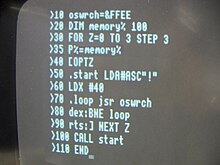BBC BASIC
 |
|
| First appeared | 1981 |
|---|---|
| Stable release |
5.90b
|
| OS |
BBC Micro MOS Technology 6502 RISC OS Sinclair ZX Spectrum CP/M DOS Microsoft Windows TI-83 Plus & TI-84 Plus |
| License | Shared source (RISC OS) Proprietary (Windows) |
| Website |
www www |
| Influenced by | |
| BASIC, Atom BASIC, BCPL | |
BBC BASIC is a programming language, developed in 1981 as a native programming language for the MOS Technology 6502 based Acorn BBC Micro home/personal computer, mainly by Sophie Wilson. It is a version of the BASIC programming language adapted for a UK computer literacy project of the BBC.
BBC BASIC, based on the older Atom BASIC (for the Acorn Atom), extended traditional BASIC with named DEF PROC/DEF FN procedures and functions, REPEAT UNTIL loops, and IF THEN ELSE structures inspired by COMAL. The interpreter also included powerful statements for controlling the BBC Micro's four-channel sound output and its low-/high-resolution eight-mode graphics display.
One of the unique features of BBC BASIC was the presence of an inline assembler allowing users to write 6502, and later: Z80, NS32016 and ARM assembly language programs. The assembler was fully integrated into the BASIC interpreter and shared variables with it, which could be included between the [ and ] characters, saved via *SAVE and *LOAD, and called via the CALL or USR commands. This allowed developers to write not just assembly language code, but also BASIC code to emit assembly language, making it possible to use code-generation techniques and even write simple compilers in BASIC.
In 1978 Hermann Hauser and Chris Curry founded Acorn Computers. Much of the code was developed at Cambridge University by Sophie Wilson and her colleagues.
Complete History available here:
...
Wikipedia
